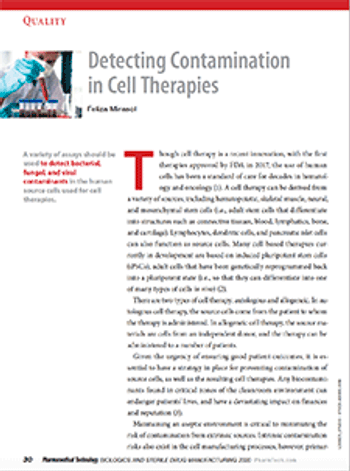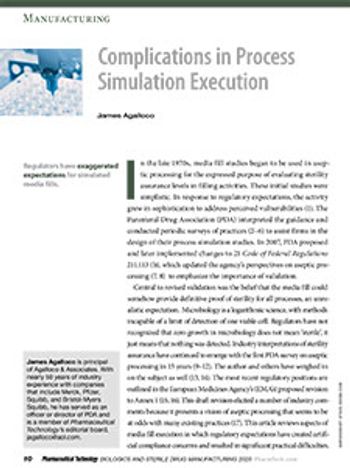
The agency sent a warning letter to Chloroquineonline.com for selling unapproved products for the treatment of COVID-19.

The agency sent a warning letter to Chloroquineonline.com for selling unapproved products for the treatment of COVID-19.

Recent drug recalls in the United States from nitrosamine contamination prompt the need for more sensitive impurity testing methods and a re-evaluation of acceptable lower limit levels.

FDA and the US Congress support innovation and access to cheaper medicines.

Products must be manufactured in accordance with appropriate regulatory requirements, even during a pandemic, says Susan J. Schniepp, executive vice-president of post-approval pharma and distinguished fellow, Regulatory Compliance Associates.

The EU’s pharmaceutical strategy has the potential to shake up the policies and regulations of the region’s medicines sector.

Bioanalytical studies are an important aspect of biologic drug development that may necessitate partnering with bioanalysis experts.

Incyte and MorphoSys have revealed that the European Medicines Agency (EMA) has validated the marketing authorization application (MAA) for tafasitamab, an anti-CD19 antibody.

Virpax Pharmaceuticals, which specializes in developing pharmaceutical products for pain management using novel drug delivery systems, has announced the successful completion of a pre-investigational new drug (IND) application meeting with the US FDA.

The Health Products Regulatory Authority (HPRA) has granted Wasdell Group an Investigational Medicinal Product (IMP) license for its European headquarters based in Dundalk, Ireland.

The White House looks to bring in credible experts for its Operation Warp Speed initiative to advance therapies and vaccines to combat the coronavirus pandemic.

The Trump Administration has awarded a hefty contract to a new pharmaceutical manufacturing consortium to produce in the United States all components of certain critical medicines needed to combat COVID-19.

Biopharmaceutical companies and federal agencies have been working overtime and assuming considerable risk to be able to supply billions of doses of any safe and effective preventive.

The European Medicines Agency is emphasizing the need for the research community to pool resources to determine which COVID-19 treatments and preventions are safe and effective.

The International Coalition of Medicines Regulatory Authorities held a virtual meeting of regulators from around the world to discuss policy issues and regulatory requirements to respond to the ongoing COVID-19 pandemic.

The EU Executive Steering Group on Shortages of Medicines Caused by Major Events met on May 13, 2020 to discuss measures the European Union is taking to ensure the availability of medicines during the COVID-19 pandemic.

A temporary restraining order was entered against Xephyr LLC, doing business as N-Ergetics requiring the company to immediately stop distributing colloidal silver products.

A variety of assays should be used to detect bacterial, fungal, and viral contaminants in the human source cells used for cell therapies.

Regulators have exaggerated expectations for simulated media fills.

The CHMP has issued a recommendation that the compassionate use of remdesivir be expanded in the treatment of more patients with severe COVID-19 symptoms.

Some observers fear that political interference in the process may erode confidence in the scientific basis for FDA regulatory decisions.

The agency is responding to companies promoting and selling medical products that claim, but are unproven, to prevent or treat COVID-19.

A rolling review of data on the use of remdesivir, an investigational antiviral medicine, for the treatment of COVID-19 has been started by EMA’s Committee for Medicinal Products for Human Use.

A high-level meeting on COVID-19 policies, organized by EMA under the auspice of the International Coalition of Medicines Regulatory Authorities (ICMRA), has brought together global regulators to ensure a coordinated pandemic response.

AbbVie and Allergan have satisfied all required antitrust clearances for the acquisition.

Tabrecta is approved to specifically target metastatic non-small cell lung cancer with a mutation that leads to MET exon 14 skipping (METex14).